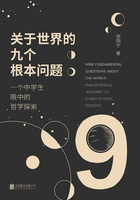
Ⅱ.On The Legitimacy of Asking Facto Questions
The most classic challenge toward the legitimacy of asking facto-questions is skepticism, which claims that questions concerning factual truth are meaningless since reliable answers cannot be discovered. As Descartes illustrated in his “First Meditation,” any proposition that concerns the external world may be underdetermined. For instance, an evil demon may have deceived your brain, creating an illusionary world that is similar to the world of Truman ’ s Show . Your perception of a delicious meal may be nothing more than a simulated input. According to skepticism,the foundation of scientific knowledge is doubtful, and, as Jonathan Vogel argues, it can be formulated in the following argument:
(1) Consider any proposition m about the world I ordinarily believe. In order to know that m, my belief that m must not be underdetermined.
(2) My belief that m is underdetermined.
(3) Therefore, I don't know the proposition m.
This argument invokes the underdetermination principle (UP):If proposition q is a competitor to proposition p, then one can know p only if one can non-arbitrarily reject q. This principle treats knowledge as Inference to the Best Explanation, according to Charles Sanders Pierce. That is, according to the classic account, given evidence E and candidate explanations H1, H2... Hn of E, infer the truth of H which best explains E.
Premise (2) entails the fact that every ordinary proposition that answers the questions of the external world has a competitor emerged from the skepticism (sensory deception), which its explanatory power is as strong as the ordinary account.
However, skeptics’ claim that all perceptions of the external world are underdetermined is false, and, justifiable answers of facto-question are possible. There are fundamental propositions that we cannot doubt,according to the philosophical doctrine of Positism. Wittgenstein claims that the skeptic fails to raise any genuine challenge, since skeptics cannot doubt everything in one question. All claims presuppose some assumptions.Wittgenstein argues, “the questions that we raise and our doubts depend on the fact that some propositions are exempt from doubt, are as it were like hinges on which those turn.”Therefore, the famous proposition “Here is one hand” is not an empirical proposition, but assumptions or postulates that are presupposed in empirical inquires and system of reference. In other words, every question raised by skeptics presupposes the existence of ground of a proposition that they cannot doubt.
Facto-knowledge has a bounded certainty and hence reliable answers can be discovered. “Knowledge is in the end based on acknowledgment,”says Wittgenstein. Truth is claimed, and certainty is a bounded quality. In science, if every person who has knowledge of Physics believe that an object on Earth, influenced by gravitational force and without supported by normal force, will fall down, then this belief is bounded by a real piece of knowledge.By introducing a bounded certainty,we can form an agreement of facto-knowledge, and hence we are legitimate to ask facto-questions.
Furthermore, according to inference of best explanation, skeptical belief is not as competitive as ordinary belief due to its lack of simplicity.Skepticism requires additional burdens of proof, which is wasteful and problematic. For an ordinary proposition, humans don't need to suppose any additional pseudo-beliefs but simply accept the state of affairs as given. However, for skepticism, the original space, time, color, taste,and everything that a person could imagine must be replaced by pseudo-space, pseudo-time, pseudo-taste... As Vogel puts it, “it is a defect to proliferate explanatory apparatus without any commensurate increase in the death or scope of what is explained.”Ordinary belief that does not presuppose any additional burden of proof is more favorable than that invokes a problematic pseudo-belief, and the former is our inference of best explanation.
In conclusion, skepticism is problematic under the attack of the objection of Positism and its second premise is problematic. As a result, facto-questions should be asked because facto-knowledge can be discovered.